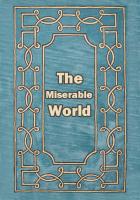"Yes, my lady," he answered."Joseph Buttle, your ladyship.""I am Miss Vanderpoel," dismissing the suddenly bestowed title with easy directness."Are you busy? I want to talk to you."No one had any reason to be "busy" at any time in Stornham village, no such luck; but Buttle did not smile as he replied that he was at liberty and placed himself at his visitor's disposal.The tall young lady came into the little shop, and took the chair respectfully offered to her.Buttle saw her eyes sweep the place as if taking in its resources.
"I want to talk to you about some work which must be done at the Court," she explained at once."I want to know how much can be done by workmen of the village.How many men have you?""How many men had he?" Buttle wavered between gratification at its being supposed that he had "men" under him and grumpy depression because the illusion must be dispelled.
"There's me and Sim Soames, miss," he answered."No more, an' no less.""Where can you get more?" asked Miss Vanderpoel.
It could not be denied that Buttle received a mental shock which verged in its suddenness on being almost a physical one.
The promptness and decision of such a query swept him off his feet.That Sim Soames and himself should be an insufficient force to combat with such repairs as the Court could afford was an idea presenting an aspect of unheard-of novelty, but that methods as coolly radical as those this questioning implied, should be resorted to, was staggering.
"Me and Sim has always done what work was done," he stammered.
"It hasn't been much."
Miss Vanderpoel neither assented to nor dissented from this last palpable truth.She regarded Buttle with searching eyes.
She was wondering if any practical ability concealed itself behind his dullness.If she gave him work, could he do it? If she gave the whole village work, was it too far gone in its unspurred stodginess to be roused to carrying it out?
"There is a great deal to be done now," she said."All that can be done in the village should be done here.It seems to me that the villagers want work--new work.Do they?"Work! New work! The spark of life in her steady eyes actually lighted a spark in the being of Joe Buttle.Young ladies in villages--gentry--usually visited the cottagers a bit if they were well-meaning young women--left good books and broth or jelly, pottered about and were seen at church, and playing croquet, and finally married and removed to other places, or gradually faded year by year into respectable spinsterhood.And this one comes in, and in two or three minutes shows that she knows things about the place and understands.
A man might then take it for granted that she would understand the thing he daringly gathered courage to say.
"They want any work, miss--that they are sure of decent pay for--sure of it."She did understand.And she did not treat his implication as an impertinence.She knew it was not intended as one, and, indeed, she saw in it a sort of earnest of a possible practical quality in Buttle.Such work as the Court had demanded had remained unpaid for with quiet persistence, until even bills had begun to lag and fall off.She could see exactly how it had been done, and comprehended quite clearly a lack of enthusiasm in the presence of orders from the Great House.
"All work will be paid for," she said."Each week the workmen will receive their wages.They may be sure.I will be responsible.""Thank you, miss," said Buttle, and he half unconsciously touched his forehead again.
"In a place like this," the young lady went on in her mellow voice, and with a reflective thoughtfulness in her handsome eyes, "on an estate like Stornham, no work that can be done by the villagers should be done by anyone else.The people of the land should be trained to do such work as the manor house, or cottages, or farms require to have done.""How did she think that out?" was Buttle's reflection.In places such as Stornham, through generation after generation, the thing she had just said was accepted as law, clung to as a possession, any divergence from it being a grievance sullenly and bitterly grumbled over.And in places enough there was divergence in these days--the gentry sending to London for things, and having up workmen to do their best-paying jobs for them.The law had been so long a law that no village could see justice in outsiders being sent for, even to do work they could not do well themselves.It showed what she was, this handsome young woman--even though she did come from America--that she should know what was right.
She took a note-book out and opened it on the rough table before her.
"I have made some notes here," she said, "and a sketch or two.We must talk them over together."If she had given Joe Buttle cause for surprise at the outset, she gave him further cause during the next half-hour.The work that was to be done was such as made him open his eyes, and draw in his breath.If he was to be allowed to do it--if he could do it--if it was to be paid for--it struck him that he would be a man set up for life.If her ladyship had come and ordered it to be done, he would have thought the poor thing had gone mad.But this one had it all jotted down in a clear hand, without the least feminine confusion of detail, and with here and there a little sharply-drawn sketch, such as a carpenter, if he could draw, which Buttle could not, might have made.
"There's not workmen enough in the village to do it in a year, miss," he said at last, with a gasp of disappointment.















